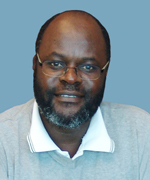Colleagues: Recently Tenured
SUSAN AMARA, PH.D., NIMH
Scientific Director of NIMH; Principal Investigator, Laboratory of Molecular and Cellular Neurobiology, Section on Molecular and Cellular Signaling

Education: Stanford University, Stanford, Calif. (B.S. in biological sciences); University of California, San Diego (Ph.D. in physiology and pharmacology)
Training: Postdoctoral training at the University of California, San Diego, and at Yale University (New Haven, Conn.)
Before coming to NIH: Thomas Detre Professor and chair of the Department of Neurobiology and co-director of the Center for Neuroscience at the University of Pittsburgh
Came to NIH: In 2013
Selected professional activities: Member, National Academy of Sciences (chair, Section 23); past president, Society for Neuroscience; Board of Scientific Counselors, NIAAA; Scientific Advisory Board, Gladstone Institute of Neurological Disease; scientific advisory board, Brain and Behavior Research Foundation; scientific advisory board, and Gill Center for Biomolecular Medicine
Outside Interests: Traveling around the world with her husband; relaxing with a good cup of coffee
Website: https://irp.nih.gov/pi/susan-amara
Research interests: My research examines the effect of psychostimulant and antidepressant drugs on the signaling properties, physiology, and acute regulation of neurotransmitters. My lab has demonstrated that transporter proteins can serve dual functions as transporters and as substrate-gated ion channels, revealing additional mechanisms by which carriers regulate neuronal excitability. Such transporter proteins are targets for addictive drugs and for medications that treat mental disorders such as depression and attention deficit hyperactivity disorder. These proteins play key roles in neuronal communication, memory, and learning.
As the scientific director for NIMH’s intramural research program, I am promoting an environment that is conducive to productive research and the training of clinical and basic scientists. NIMH researchers study the behavioral, systems, cellular, and molecular mechanisms of normal brain function as well as conduct clinical investigations into the diagnosis, treatment, and prevention of mental illness (including mood disorders and anxiety, schizophrenia, obsessive-compulsive disorder, attention deficit hyperactivity disorder, and pediatric autoimmune neuropsychiatric disorders). The intramural research program has the opportunity to do many innovative things at different levels and that one can’t do elsewhere. The ability to be nimble and occasionally take risks is a unique aspect of the intramural research program.
JULIA PROMISEL COOPER, PH.D., NCI-CCR
Senior Investigator and Head, Telomere Biology Section, Laboratory of Biochemistry and Molecular Biology

Education: Emory University, Atlanta (B.S. in biology); University of Colorado Health Sciences Center, Denver (Ph.D. in biochemistry/biophysics/genetics)
Training: Postdoctoral training at NIADDK (now NIDDK and NIAMS); University of Colorado at Boulder (Howard Hughes Medical Institute); and Imperial Cancer Research Fund (London; now Cancer Research UK)
Before coming to NIH: London Research Institute, Cancer Research UK
Came to NIH: In 1992 for training
Selected professional activities: Organized several international conferences
Outside interests: Traveling; hiking; eating; cooking; going to the theater; spending time with her adult children
Research interests: I and my lab focus on telomeres, the nucleoprotein complexes that form the ends of linear chromosomes. Telomeres protect our genomes and choreograph chromosome movements; they affect a range of biological processes from cancer avoidance to healthy gamete formation. They prevent the degradation and fusion of chromosome ends and ensure that natural chromosome ends do not elicit the cell-cycle arrest pathways that respond to damage-induced DNA breaks. Telomeres are a particular focus of our research on tumorigenesis (which is associated with genomic instability and telomerase activation) and aging (which is accompanied by a progressive decline in telomere length). However, the complete repertoire and underlying mechanisms of telomere function are not yet understood.
The telomeres of fission yeast, the model system we use most in the lab, are remarkably similar to those of humans but provide precise genetic manipulability. Concepts we have developed by studying fission yeast telomeres have repeatedly been shown to predict observations in mammals. Topics we are exploring include the cell-cycle regulation of telomere function, the fascinating roles taken on by telomeres in controlling spindle formation and centromere assembly during meiosis, and surprising ways in which some cells (such as telomerase-minus cancer cells) can survive in the absence of canonical telomeres.
MARIANA KAPLAN, M.D., NIAMS
Senior Investigator; Chief of the Systemic Autoimmunity Branch

Education: National Autonomous University of Mexico, Mexico City (M.D.)
Training: Residency in internal medicine at the National Institute of Medical Sciences and Nutrition in Mexico City; rheumatology fellowship and postdoctoral training at the University of Michigan (Ann Arbor, Mich.)
Before coming to NIH: Professor of medicine, Division of Rheumatology, University of Michigan
Came to NIH: In 2013
Selected professional activities: Member, American Society of Clinical Investigation; Lupus Foundation of America Scientific Advisory Council; adjunct professor, University of Michigan; Section Editor, Journal of Immunology (2009–2013)
Outside interests: Spending time with her family; traveling; playing piano; reading literature; listening to music
Web site: http://www.niams.nih.gov/Research/Ongoing_Research/Branch_Lab/individual_page.asp
Research interests: My research has focused on unraveling the fundamental mechanisms that lead to the development and perpetuation of systemic autoimmune disorders, particularly systemic lupus erythematosus (SLE) and rheumatoid arthritis (RA), and their associated organ damage. I and my lab are trying to determine how and why premature vascular damage and atherosclerosis occur in SLE and RA, with an interest in how innate immune responses contribute to endothelial perturbations. We are characterizing how abnormal neutrophil responses in autoimmune disorders contribute both to the loss of immunological tolerance and to end-organ damage, including the putative role of neutrophil extracellular traps (networks of extracellular fibers, primarily composed of DNA from neutrophils, which bind pathogens). I am also interested in doing preclinical and clinical studies and trials to identify novel biomarkers and therapeutic targets that may prevent premature vascular damage and chronic inflammation in systemic autoimmunity.
SCOTT YUNG HO KIM, M.D., PH.D, CC
Senior Investigator, Department Of Bioethics

Education: Wheaton College, Wheaton, Ill. (B.A. in philosophy); University of Chicago, Chicago (Ph.D. in philosophy); Harvard Medical School, Boston (M.D.)
Training: Residency in psychiatry, Massachusetts General Hospital (Boston); National Research Service Award in Geriatric and Neuropsychiatric Psychopathology Research, University of Rochester (Rochester, N.Y.)
Before coming to NIH: Co-director of the Center for Bioethics and Social Sciences in Medicine, University of Michigan (Ann Arbor, Mich.)
Came to NIH: In 2013
Selected professional activities: Author of Evaluation of Capacity to Consent to Treatment and Research (Oxford, 2010); professor of psychiatry (adjunct), University of Michigan
Outside interests: Trout fishing; music; sports (“I remain a loyal Michigan Wolverine”)
Web site: http://bioethics.nih.gov/people/kim-bio.shtml
Research interests: Most of my work has focused on the ethics of human subject research—the assessment of the decision-making capacity of people who are potential subjects of clinical research; surrogate consent for dementia research; ethics of sham neurosurgical trials; and informed consent and therapeutic misconception—as well as some work on the reform of institutional review boards.
Because bioethics is still an evolving field in terms of empirical research, I’m very interested in using a variety of methods to integrate theoretical and empirical approaches. For example, we’ve used a method called democratic deliberation in which our subjects spend a day learning and deliberating about a complex bioethical issue. We can then obtain from them more considered ethical views than just their impressionistic opinions. We’ve also used mixed methods (in-depth qualitative interviews along with experimental surveys that use a philosophical linguistics framework) to examine whether research subjects conflate research participation with treatment—a phenomenon called “therapeutic misconception” that is thought to be highly prevalent but which we are finding may be due to a measurement problem. And I’ve begun some new collaborative projects in the Department of Bioethics, which I’m finding to be a wonderfully collegial place.
SAM MBULAITEYE, M.D., NCI-DCEG
Senior Investigator, Infections and Immunoepidemiology Branch, NCI Division of Cancer Epidemiology and Genetics (DCEG)

Education: Makerere University, Kampala, Uganda (MBChB and M.Med. in internal medicine); University of Cambridge, Cambridge, U.K. (M.Phil. in epidemiology and biostatistics)
Before coming to NIH: Senior medical officer, Uganda Virus Research Institute (Entebbe, Uganda)
Came to NIH: In 2000 as a research fellow in NCI-DCEG; became tenure-track investigator in 2005
Selected professional activities: Adjunct lecturer at George Washington University School of Public Health (Washington, D.C.); editorial board member, International Journal of Cancer and Frontiers in Cancer Epidemiology and Prevention; co-editor-in-chief, Infectious Agents and Cancer
Outside interests: Biking; hiking; jogging; running marathons; stargazing
Web site: https://irp.nih.gov/pi/sam-mbulaiteye
Research interests: Burkitt lymphoma (BL) is the most common childhood cancer in Africa and the third most common lymphoid malignancy in developed countries. My work seeks to measure the association between malaria markers (parasite prevalence, load, and genotypes) and the immune response to malaria proteins in patients at risk for BL. I am interested in understanding how this relationship is modified by other infections—such as Epstein–Barr virus (EBV), human immunodeficiency virus (HIV), and stool parasites—that are common in children with BL. I am the principal investigator in the Epidemiology of Burkitt Lymphoma in the East African Children and Minors (EMBLEM) study, a multiyear, multisite study of childhood BL (http://dceg.cancer.gov/research/cancer-types/lymphoma-burkitt-hodgkin-non-hodgkin/burkitt-lymphoma-emblem). Using questionnaire data and genomic methods, I will evaluate the association between malaria-resistance gene polymorphisms, malaria parasite diversity, and EBV genetic variants with BL. Additionally, in collaboration with the NCI Office of Cancer Genomics, I am using fresh-frozen tumor tissues collected from a subset of BL cases to conduct BL tumor genome sequencing. My studies may lead to the discovery of molecular abnormalities that drive BL and that may be targeted for therapy or prevention.
My work on BL outside of Africa seeks to measure the risk of BL in immunosuppressed populations, such as those who are HIV-positive or receive immunosuppression medications to prevent rejection of transplanted organs. I am conducting studies to investigate whether BL in settings where malaria is absent differs from BL in Africa.
This page was last updated on Wednesday, April 27, 2022
